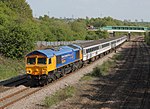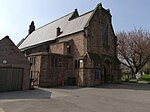The Masbrough Independent Chapel (also known as Masbro Independent Chapel, Masbrough Chapel and Masbro Chapel) was an Independent or Congregationalist chapel in the Masbrough district of Rotherham, from the 18th century until the 1970s, at which point it became part of the United Reformed Church.
The chapel remained part of the United Reformed Church until its closure as a place of worship towards the end of the 20th century.
The chapel's congregation merged with the Greasbrough congregation of the United Reformed Church and then, in 2003, with the Greasbrough Methodist congregation to form a local ecumenical partnership using the name Greasbrough United Church.
The former chapel building was Listed as a building of special historical or architectural interest. After it was no longer used as a place of worship, it found a new use as a carpet warehouse.The building suffered two serious fires in 2012, and it was demolished in December 2012.The chapel was closely associated with the Walker family who were leading industrialists in Rotherham. The Walker Mausoleum stands in the chapel's burial ground and the Mausoleum is itself a Listed building.The chapel was also closely associated with the Rotherham Independent Academy, a training school for ministers, founded in 1795. Later in the 19th century, the Academy moved from Masbrough to new premises built in "collegiate gothic" style on Moorgate Road, Rotherham.
The Moorgate Road premises are now occupied by the Thomas Rotherham College.
In 1795, Dr Edward Williams took the pastorate at the chapel and also became the first theological tutor at the then newly formed Rotherham Independent Academy which was built nearby. Joshua and Thomas Walker were generous benefactors to the Academy.Williams had been one of those involved in the formation in 1794 of the missionary society that was later named London Missionary Society. Williams preached the charge to the first missionaries sent out by the society.During the ministry of the Reverend Thomas Nicholson (served 1879–1900) the worshipping congregation grew from 225 to 530.During the Depression of the 1920s and 30s, the congregation organized the construction of a bowling green on land near the chapel by un-employed men, for their recreational enjoyment, and classes in boot repair and other things were held to help them through the Depression.During the 1950s, the chapel's minister Cyril Grant provided ministerial oversight for the formation and development of a new church at Herringthorpe, the church that is now the Herringthorpe United Reformed Church. This work first started in hired rooms at the Herringthorpe Junior School, later moving into its own purpose-built premises on Wickersley Road, adjacent to the Stag Inn.








